|
De Belgische dichter en schrijver Leonard Nolens werd geboren in Bree op 11 april 1947. Zie ook alle tags voor Leonard Nolens op dit blog.
Bed
Ik ben niet gemaakt om 's avonds de trap op te gaan
Naar het smalste bed van de wereld.
Ik krijg het aan niemand verkocht.
Ik ben niet gemaakt om 's nachts het licht uit te doen
En mijn ogen te sluiten alleen.
Kon iemand dat maar in mijn plaats.
Ik ben niet gemaakt om wakker te worden 's ochtends
Met een opgeschoonde kop.
Ik doe alles verkeerd in mijn slaap.
Ik ben niet gemaakt om het huis uit te gaan,
Om boven de hondenweide de blaffende zee te zien
Van licht waaraan geen touw valt vast te knopen.
Ik ben niet gemaakt om in het vergezicht
Van een kantoorlandschap te zitten zweten
Onder de zon van een baas.
Voor bredere bedden heeft hij geen geld.
Ik ben niet gemaakt.
Meeuwen voeren
1
Als herten in de verte dorstend naar land
Burlen de schepen 's nachts en wekken mijn vriendin.
Wij zijn ook nog maar pas naar hier gekomen
Om nieuw leven. Oude liefde wou dat zo.
's Ochtends tilt het noorderlicht de slaapvertrekken
Uit hun voegen, hemelt ons hier langzaam op
In een machtig geheel, een helende verblinding.
Daar kunnen wij in schuilen voor elkaar.
2
Wij staan op het terras te praten met een wolk
Van af- en aanvliegende meeuwen, geven namen
Aan kiftende snavels die ons brood betwisten,
Ons vlees vliegen naar de stampende haven.
Zij houdt zo van hun magnifieke wreedheid, de zwevende
Obsceniteit van al die malse zatgevreten lijven,
Hun opvliegende natuur, hun vleesgeworden honger.
Zo aards en zo gehemeld zijn ze zeer waarschijnlijk
De krijsende gedachten van haar dode God.
Ze komen gulzig eten uit mijn lege handen
Op het Zuid, het nieuwe huis dat zij me leert,
Waar wij vanouds de werkelijkheid ten einde dromen
Van liefde die dat burlen hoort en niet kan slapen.
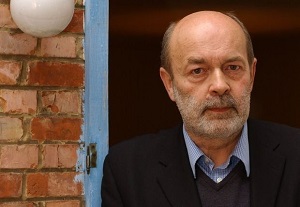
Leonard Nolens (Bree, 11 april 1947)
De Amerikaanse dichter en schrijver Mark Strand werd geboren op 11 april 1934 in Summerside, Prince Edward Island, Canada. Zie ook alle tags voor Mark Strand op dit blog.
The View
For Derek Walcott
This is the place. The chairs are white. The table shines.
The person sitting there stares at the waxen glow.
The wind moves the air around, repeatedly,
As if to clear a space. ‘A space for me,' he thinks.
He's always been drawn to the weather of leavetaking,
Arranging itself so that grief - even the most intimate -
Might be read from a distance. A long shelf of cloud
Hangs above the open sea with the sun, the sun
Of no distinction, sinking behind it - a mild version
Of the story that is told just once if true, and always too late.
The waitress brings his drink, which he holds
Against the waning light, but just for a moment.
Its red reflection tints his shirt. Slowly the sky becomes darker,
The wind relents, the view sublimes. The violet sweep of it
Seems, in this effortless nightfall, more than a reason
For being there, for seeing it, seems itself a kind
Of happiness, as if that plain fact were enough and would last.
XVI
It is true, as someone has said, that in
A world without heaven all is farewell.
Whether you wave your hand or not,
It is farewell, and if no tears come to your eyes
It is still farewell, and if you pretend not to notice,
Hating what passes, it is still farewell.
Farewell no matter what. And the palms as they lean
Over the green, bright lagoon, and the pelicans
Diving, and the glistening bodies of bathers resting,
Are stages in an ultimate stillness, and the movement
Of sand, and of wind, and the secret moves of the body
Are part of the same, a simplicity that turns being
Into an occasion for mourning, or into an occasion
Worth celebrating, for what else does one do,
Feeling the weight of the pelicans' wings,
The density of the palms' shadows, the cells that darken
The backs of bathers? These are beyond the distortions
Of change, beyond the evasions of music. The end
Is enacted again and again. And we feel it
In the temptations of sleep, in the moon's ripening,
In the wine as it waits in the glass.
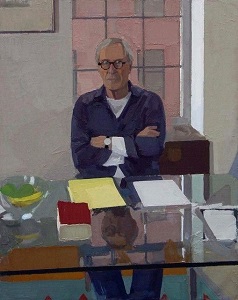
Mark Strand (11 april 1934 – 29 november 2014)
Portret door John Dubrow, 2010 - 2015
De Italiaanse schrijfster Silvia Avallone werd geboren in Biella op 11 april 1984. Zie ook alle tags voor Silvia Avallone op dit blog.
Uit: Swimming to Elba (Vertaald door Antony Shugaar)
“It’s an entire zoo in here: pig iron everywhere, cranes of every species and variety. Rusted animals with horned heads… The dense black sludge of molten metal was bubbling in the crucibles, potbellied swiveling barrels running along on the mill trains. Giant tanks on wheels that looked like primordial creatures… Metal was everywhere, in the process of birth. Unceasing cascades of steel and glistening cast iron and viscous light. Torrents, rapids, estuaries of molten metal coursing through the flow lines, into the ampules of the ladles and pouring out into the tundishes to drain into the molds for furnaces and trains... Raw materials were being transformed at every hour of the day and night… You could feel the blood rushing through your arteries at a fantastic velocity in there, and from the arteries to the capillaries, while your muscles built up in tiny fractures: You were regressing to the animal state. Alessio was small and alive in this vast burgeoning organism.
(...)
He could feel the pressure of it at the nape of his neck, the black tower of the A-Fo 4, a giant spider that digests, ruminates, and belches out... Bluish fluorescences, toxic clouds in volumes sufficient to poison not only the Val di Cornia, but all of Tuscany... tons of metal whirling like birds, yellow clouds of carbon smoke, black at the mouths of the smokestacks. It’s called continuous integrated steel production. As Alessio walked he crushed nettles and chunks of refractory brick underfoot. Metal saturated the ground and his skin... the elementary motion of machinery that is no different from life.”

Silvia Avallone (Biella, 11 april 1984)
De Tunesische dichter, schrijver, essayist en vertaler Walid Soliman werd geboren op 11 april 1975 in Tunis. Zie ook alle tags voor Walid Soliman op dit blog.
Uit: Three hours in Fiumicino (Vertaald door Jason Casper)
“But before I could finish, it was announced over the loudspeaker that all travelers to Montreal were to get ready for boarding. And at that she said to me, “Too bad… this was a nice conversation.” But before rising to leave and say goodbye, she searched a moment in her handbag before taking out a small crystal souvenir in the shape of a dolphin, and presented it to me. “I’m sorry also… I don’t have anything else either to give you but this dolphin. It can serve as your reminder about Bella…” But before I took the souvenir from her hand she used it to take out a notebook from her coat pocket and quickly wrote her full name, address, and phone number. “I’m really happy to meet you… it’s too bad it’s gotten late... I’ll await your letter and respond without delay… there wasn’t enough time to take your address…”
The designated gate for flights to Canada was quite a distance away, so Bella had to hurry. When she disappeared after leaving the cafeteria, I took time to admire the crystal dolphin she had given me. It seemed quite charming. Only a few moments passed until I heard the call over the loudspeaker for all passengers to Brussels to return to the airplane. I put the dolphin in my coat pocket, and held it as one might hold on to a precious piece of art.”
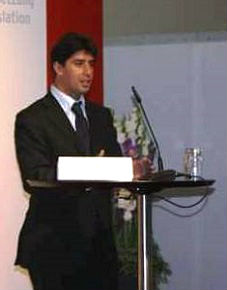
Walid Soliman (Tunis, 11 april 1975)
De Franse schrijver, essayist en uitgever Hubert Nyssen werd geboren in Boendael aan de rand van Brussel op 11 april 1925. Zie ook Zie ook alle tags voor Hubert Nyssen op dit blog.
Uit: Le Miroir Invisible
« Une fantasmagorie d’une troublante vraisemblance, un beau travail d’illusionniste. Mais cela suffisait-il pour expliquer le succès ? Non, il ne fallait pas l’oublier, pensait Rondier, il y avait aussi le talent et la réputation de Solange Vattier. Elle avait une carrière au cinéma, elle avait tourné pour Truffaut et Rohmer, elle avait des admirateurs, et la subtile essence venue de sa voix avait pu exercer une sorte de fascination contagieuse...
Oui, certes, mais l'idée même de la pièce devait avoir sa part dans l'engouement. Cette idée, Serge Rondier l’avait eue un jour où il déjeunait seul dans une brasserie de la rue Racine. Il s'était pris à observer une inconnue dans un des miroirs de la salle, avec une insistance d'autant plus tranquille que, placée comme elle l'était, elle ne pouvait, pensait-il, surprendre son regard. C'était une femme de la quarantaine, d'une simple beauté, celle qui vient du fond de l'être et non de ses apprêts, visage magnifique en tout cas, mais le reste, d'où il était, Rondier ne le voyait pas. Cette femme était là, dans le miroir, plus inquiétante que désirable. L’imagination du dramaturge était partie à l'aventure avec la vieille idée que tout est dans tout car il avait repéré sur la joue de cette inconnue un grain de beauté d'une dimension inaccoutumée qui était pourtant posé là comme la chose la plus naturelle du monde, et il s'était dit que, disparue du miroir qui lui offrait son image, la femme resterait dans sa mémoire par cette apostille. Il n'en avait pas fallu davantage pour que son imagination vînt à lui suggérer que le grain de beauté contenait cette femme comme elle-même contenait le monde.Tout était bien dans tout... Et par une de ces petites illuminations que connaissent les créateurs, il avait eu l'idée puis le désir soudain d'écrire une pièce en forme de monologue où une telle femme, oui, celle-là précisément, serait aux prises avec un amant qui s'obstinerait à la convaincre qu’il voyait en elle la totalité du monde sensible. Une monade, quoi, une vraie monade ! Oui, mais cette femme ne comprendrait pas un amour qui la dépassait et dont les mots lui paraitraient destinés à une autre. Le malentendu engendrerait l'inquiétude puis la discorde et avec elle la désunion. Son amant parti, peut-être mort (mort ou parti, on verrait bien... mais c'était tout vu, et Rondier avait déjà décidé de flinguer le personnage), la femme aurait la révélation de la passion peu ordinaire dont elle avait été l'objet. Alors, Eurydice à contre rôle, elle repartirait à rebours dans sa vie pour tenter de dire à l’amant disparu ce qu'elle n'avait su lui dire quand, par ses illuminations, il l'effrayait. »
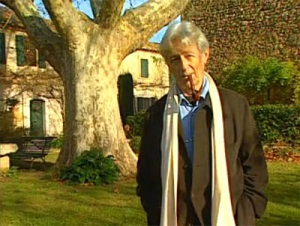
Hubert Nyssen (11 april 1925 – 12 november 2011)
De Amerikaanse dichteres en schrijfster Dorothy Allison werd geboren op 11 april 1949 in Greenville, South Carolina. Zie ook Zie ook alle tags voor Dorothy Allison op dit blog.
The Women Who Hate Me
1.
The women who do not know me.
The women who, not knowing me, hate me
mark my life, rise in my dreams and shake their loose hair
throw out their thin wrists, narrow their already sharp eyes
say Who do you think you are?
Lazy, useless, cuntsucking, scared, stupid
What you scared of anyway?
Their eyes, their hands, their voices.
Terrifying.The women who hate me cut me
as men can’t. Men don’t count.
I can handle men. Never expected better
of any man anyway.
But the women,
shallow-cheeked young girls the world was made for
safe little girls who think nothing of bravado
who never got over by playing it tough.
What do they know of my fear
What do they know of the women in my body?
My weakening hips, sharp good teeth,
angry nightmares, scarred cheeks,
fat thighs, fat everything.
Don’t smile too wide. You look like a fool.
Don’t want too much. You ain’t gonna get it.
Ain’t gonna get it.
Goddamn.
Say goddamn and kick somebody’s ass
that I am not even half what I should be
full of terrified angry bravado.
BRAVADO.
The women who hate me
don’t know
can’t imagine
life-saving, precious bravado.
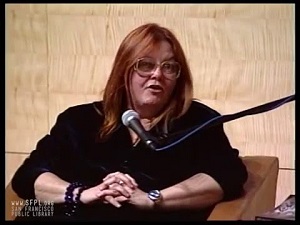
Dorothy Allison (Greenville, 11 april 1949)
De Duitse dichter Rolf Schilling werd geboren in Nordhausen in de Harz op 11 april 1950. Zie ook alle tags voor Rolf Schilling op dit blog.
Traumgänger
Ein dunkler Strom, der über Stufen rann,
Und wie ein Wiegen hob es langsam an,
Und wie ein Schatten aus dem Paradies
Trat einer ein aus Nacht und Schlafes Bann.
Es war ein Knabe, der die Flöte blies,
Er trug auf Schultern schmal das Purpur-Vlies,
Und was er wirkte, was sein Wink beschwor,
War Stolz und Traurigkeit und nichts als dies.
Wie Schlangen stand sein Sang vor deinem Ohr,
Doch als die Lippe dann das Lied verlor,
War Sanftheit bald in Wagemut verkehrt,
Und Speere blitzten aus dem Rosenflor.
Ein Schein von Blut auf seinem Bronze-Schwert
War dir Befehl zu folgen, und er lehrt:
Wer so wie du den Wurf Apolls nicht scheut,
Ist edlen Stamms und aller Weihen wert.
Sein Finger - war es gestern? War es heut? -
Band Flechten aus Orakeln und Gekräut,
So setz die Zeichen, Blut und Banner gib
Dem Drifter, daß er deine Träume deut.
Ob er die Antwort in den Sand dir schrieb?
Ob er dein Floß zu dunklen Ufern trieb?
Und steht sein Licht noch über Tal und Teich,
Wenn vom Gesagten kaum ein Hauch verblieb?
Hier sieh das Tor, hier endet sein Bereich,
Und Flocken lösen sich und fallen weich
Auf deine Stirn, verstoßen ins Gewog
Von seinem Stab, dem deinen nicht mehr gleich.
Du weißt nicht, ob er lachte, ob er log,
Ob er den Lorbeer dir zu Kronen bog,
Nicht wer ihn ausgesandt noch wer er war,
Nur daß er weilte und dann weiterzog.
Doch lag ein dunkler Glanz auf seinem Haar,
Ein Widerschein von Größe und Gefahr,
Und all dein Ruhm, novemberlich im Mai,
Verweht vor ihm wie Asche vom Altar.
So schritt er leicht im Wind und ging vorbei,
Du weißt, er liebt dich nicht, was immer sei,
Und was auch wiederkehrt und was begann,
Trägt ihn nicht her und gibt sein Bild nicht frei.
Nur dunkles Blut, das über Stufen rann,
Und wie ein Wiegen hebt es manchmal an
Und wird als Weinen laut und wächst zum Schrei
Und stirbt in Schlafes Haft und Traumes Bann.
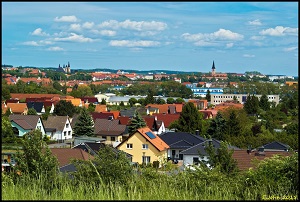
Rolf Schilling (Nordhausen, 11 april 1950)
Nordhausen am Harz
De Amerikaanse schrijver Glenway Wescott werd geboren op 11 april 1901 in Kewaskum, Wisconsin. Zie ook alle tags voor Glenway Wescott op dit blog.
Uit: The Grandmothers
“Until Alwyn Tower grew to manhood he never forgot that everyone was older than he. People remembered things not in existence now, and many of them had been born in houses which had vanished long ago.
A cabin which had stood in the melon patch had been his father’s birthplace; and as a child, jumping over the heavy, downy vines, he tried in vain to find a trace of its foundations.
His uncle Jim, the minister, on the other hand, had not been born in the garden, but in a building which was now the woodshed. Alwyn asked himself how anyone could have slept in that poor shack, whose floor was the ground, trodden and scattered with chips, where the snow sifted in winter on the woodpiles. Of course when his grandmother had lain there with a baby in her arms, it must have been warm, safe, and pink, in the firelight. Now she was a strong old woman with sandy-gray hair ; and only with difficulty, by calling to mind the family daguerreotypes, W'as he able to' imagine a young mother in that vanished bed.
Alwyn’s father and mother shared with his grandparents the third house on the farm which his grandfather had bought from the government when Wisconsin was a wilderness. In that house his young aunt Flora had been born, in what was now his mother’s parlor, exactly below the spare bedroom papered with forget-me-nots where Alwyn himself had slept when he was a baby. The house had been rearranged frequently, and augmented by new rooms, porches, doors, and windows, as the family grew. Now the old people and Flora kept house by themselves in the south wing.
In their sitting room the sunlight burned brightly on stiff patterns of wallpaper, on the red garlands of the carpet, the ripples painted on the woodwork in imitation of quarter-sawed oak, and the false-Nottinghara curtains looped up in the windows. A rack on the wall held a row of hand-painted plates, the work of his aunt and his great-aunt Nancy, decorated with birds, wild roses, and rosebuds.
Beneath the plate rack stood a couch, upholstered in rows of yellow tapestry biscuits, with a green button at each intersection of the crevices. It had the proportions of a lion’s body — the legs carved in claws, the sloping back, the head uplifted under a mass of fringed pillows. In spite of its discomfort, Alwyn’s grandfather took his nap there every afternoon, his spectacles in his hand, an open newspaper over his face.”
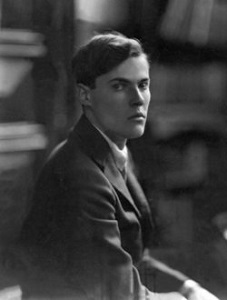
Glenway Wescott (11 april 1901 - 22 februari 1987)
De Franse schrijver Claude Tillier werd geboren in Clamecy, Nièvre, op 11 april 1801, Zie ook alle tags voor Claude Tillier op dit blog.
Uit: Mon oncle Benjamin
« Quand nous avons tous les appétits de la jeunesse, que notre sang est plein de fer et d’alcool, nous n’avons pas un écu ; quand nous n’avons plus ni dents, ni estomac, nous sommes millionnaires. Nous avons à peine le temps de dire à une femme : « Je t’aime ! » qu’à notre second baiser, c’est une vieille décrépite. Les empires sont à peine consolidés, qu’ils s’écroulent ; ils ressemblent à ces fourmilières qu’élèvent, avec de grands efforts, de pauvres insectes ; quand il ne faut plus qu’un fétu pour les achever, un bœuf les effondre sous son large pied, ou une charrette sous sa roue. Ce que vous appelez la couche végétale de ce globe, c’est mille et mille linceuls superposés l’un sur l’autre par les générations. Ces grands noms qui retentissent dans la bouche des hommes, noms de capitales, de monarques, de généraux, ce sont des tessons de vieux empires qui résonnent. Vous ne sauriez faire un pas que vous ne souleviez autour de vous la poussière de mille choses détruites avant d’être achevées.
J’ai quarante ans ; j’ai déjà passé par quatre professions ; j’ai été maître d’études, soldat, maître d’école, et me voilà journaliste. J’ai été sur la terre et sur l’Océan, sous la tente et au coin de l’âtre, entre les barreaux d’une prison et au milieu des espaces libres de ce monde ; j’ai obéi et j’ai commandé ; j’ai eu des moments d’opulence et des années de misère. On m’a aimé et on m’a haï ; on m’a applaudi et on m’a tourné en dérision. J’ai été fils et père, amant et époux ; j’ai passé par la saison des fleurs et par celle des fruits, comme disent les poètes. Je n’ai trouvé dans aucun de ces états que j’eusse beaucoup à me féliciter d’être enfermé dans la peau d’un homme, plutôt que dans celle d’un loup ou d’un renard, plutôt que dans la coquille d’une huître, dans l’écorce d’un arbre ou dans la pellicule d’une pomme de terre. Peut-être si j’étais rentier, rentier à cinquante mille francs surtout, je penserais différemment."
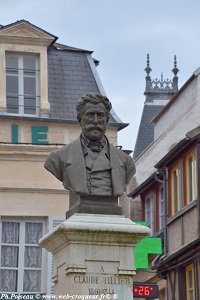
Claude Tillier (11 april 1801 - 12 oktober 1844)
Borstbeeld in Clamecy
Zie voor nog meer schrijvers van de 11e april ook mijn blog van 11 april 2017 en ook mijn blog van 11 april 2015 deel 1 en eveneens deel 2 en ook deel 3.
Zie voor bovenstaande schrijvers ook mijn blog van 11 april 2007 en ook mijn blog van 11 april 2008 en eveneens mijn blog van 11 april 2009.
11-04-2018 om 18:48
geschreven door Romenu 
Tags:Leonard Nolens, Mark Strand, Silvia Avallone, Walid Soliman, Dorothy Allison, Hubert Nyssen, Rolf Schilling, Glenway Wescott, Claude Tillier, Romenu
|

